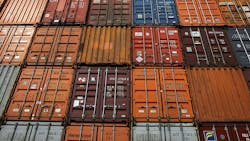The European Union published its preliminary list of U.S. goods being targeted in a $12 billion plan for retaliatory tariffs over subsidies to Boeing Co., with a focus on farm products from areas that help form President Donald Trump’s political base.
The European Commission began a public consultation over the American products ranging from ketchup and nuts to video-game consoles and bicycle pedals. The World Trade Organization will ultimately decide the level of damages the EU can seek, with a verdict possible toward the end of this year or in early 2020.
The EU retaliation plan follows a U.S. threat to seek $11 billion in damages through duties on European goods ranging from helicopters to cheeses to counter state aid to Airbus SE. Both moves stem from parallel, 14-year-old, disputes at the WTO over market-distorting support for aircraft makers.
“European companies must be able to compete on fair and equal terms,” EU Trade Commissioner Cecilia Malmstrom said in an emailed statement on Wednesday in Brussels. “We must continue to defend a level-playing field for our industry.”
Crosscurrents are rippling through transatlantic trade ties as the EU and U.S. prepare for negotiations on removing industrial tariffs. At the same time, the two sides are engaging in renewed sparring over aircraft aid and Trump’s “America First” protectionism, especially his controversial duties on foreign steel and aluminum based on national-security grounds and a threat he has kept alive to apply automotive levies on the same basis.
EU imports of the goods on the preliminary retaliation list in the Boeing dispute have a total value of around $20 billion and the bloc would eventually apply duties on some or all of the products once the WTO sets the damages limit, according to the commission, the bloc’s executive arm.
The American products also include casino game tables, tobacco-seed oil, vodka, orange juice and a range of foods including chocolate and frozen lobster.
So far, the EU has applied tit-for-tat tariffs on 2.8 billion euros (US$3.2 billion) of American goods in response to Trump’s metal duties and threatened to hit a further 20 billion euros of U.S. products with levies should Washington restrict automotive imports.
Malmstrom repeated an EU position dating back to the start of the WTO disputes over aircraft aid by saying the bloc hoped for a negotiated settlement.
“We do not want a tit-for-tat,” she said. “While we need to be ready with countermeasures in case there is no other way out, I still believe that dialog is what should prevail between important partners such as the EU and the U.S., including in bringing an end to this longstanding dispute. The EU remains open for discussions with the U.S., provided these are without preconditions and aim at a fair outcome.”
By Jonathan Stearns
About the Author
Bloomberg
Licensed content from Bloomberg, copyright 2016.
